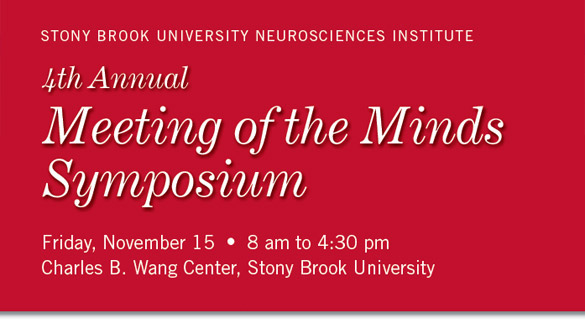
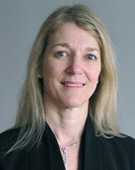 |
CORNELIA ISABELLA BARGMANN, PHD — KEYNOTE SPEAKER Cornelia Isabella Bargmann, PhD is the Torsten N. Wiesel professor at Rockefeller University, Head of the Lulu and Anthony Wang Laboratory of Neural Circuits and Behavior, and co-director of the Shelby White and Leon Levy Center for Mind, Brain and Behavior. Dr. Bargmann is also a Howard Hughes Medical Institute investigator and a member of the National Academy of Sciences, and is one of two chairs of the NIH planning committee for the initial phase of President Barack Obama's ambitious $100 million project to map the brain. |
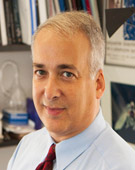 |
TODD SACKTOR, MD Todd Sacktor, MD Todd Sacktor, MD, received an A.B. from Harvard College in 1978, and an M.D. from the Albert Einstein College of Medicine in 1982. After a residency in neurology at Columbia Presbyterian Medical Center, he studied the role of protein kinase C (PKC) in short-term memory in the model system Aplysia californica, under the tutelage of Dr. James H. Schwartz, at the Center for Neurobiology and Behavior, directed by Dr. Eric R. Kandel. In his own laboratory at SUNY Downstate Medical Center in 1990, he discovered a brain-specific PKC isoform, PKMzeta. Together with colleagues, his lab demonstrated that PKMzeta was both necessary and sufficient for maintaining long-term potentiation (LTP) and storing the long-term memory trace. |
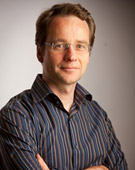 |
ARNDE PRALLE, PHD Arnde Pralle, PhD Arnde Pralle, PhD, Assistant Professor Physics, Adjunct Assistant Professor Biophysics and Physiology, State University New York at Buffalo, received his PhD at Ludwig-Maximilians-University, Munich in 1999 and also completed his Dipl. At Justus-Liebig-University, Giessen, 1994. Dr. Pralle completed his post-doctoral fellowship and Associate Specialist Department of Molecular Cell Biology Prof. Ehud Isacoff at University of California Berkeley, 200-2006. |
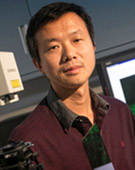 |
SHAOYU GE, PHD Shaoyu Ge, PhD Shaoyu Ge, PhD Received his PhD of Neurobiology and Biophysics in 2002 from the University of Science and Technology in China. After recieveing his PhD, he performed his postdoctoral research in Neurobiology at the Baylor College of Medicine in Houston completed in 2003 and also completed postdoctural research at the Johns Hopkins University of Batimore in the field of study for Adult Neural Stem Cell: Physiology and Function. Shaoyu Ge is a reviewer for Neuron, Moleculat Psychiatry, Journal of Neuroscience, Journal of Physiology, Journal of Neurophysiology, Developmental Neurobiology, Neuroscience, et al. On the edition board of : Frontiers of biology, Frontiers in Molecular Neuroscience. |
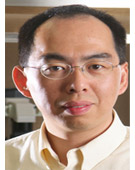 |
JIAN FENG, PHD Jian Feng, PhD Jian Feng, PhD, Dr. Feng received his B.Sc. in biochemistry from Nanjing University in China. After Ph.D. study in cell signaling with Dr. James Ihle at HHMI/St. Jude Children's Research Hospital in Memphis, Tennessee, he performed postdoctoral research in neuroscience with Dr. Paul Greengard at the Rockefeller University in New York City. Dr. Feng joined the State University of New York at Buffalo in 2000 as an Assistant Professor and rose through the rank to Professor in 2010. His research tries to understand how people get Parkinson's disease and how to use mechanistic understanding of the disease to find its cure. The lack of satisfactory animal models of this disease propelled his laboratory to develop new stem cell technologies to use cells from Parkinson's disease patients to study the problem. He has discovered critical functions of the Parkinson's disease gene parkin in human midbrain dopaminergic neurons derived from patient-specific induced pluripotent stem cells. More recently, his laboratory developed new methods for the direct conversion of human fibroblasts to different types of brain cells. His current research aims at building a model of Parkinson's disease based on the patient's own genome. |
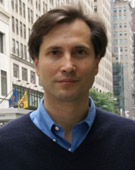 |
JOSE-MANUEL ALONSO, MD, PHD Jose-Manuel Alonso, MD, PhD Jose-Manuel Alonso, MD, PhD, obtained his M.D. at the University of Santiago de Compostela in 1989 and his Ph.D. at the Universidad Autónoma de Madrid in 1992. In 1993, he became a postdoctoral student under the supervision of Torsten Wiesel and Clay Reid at Rockefeller University. He has been a faculty member since 1999, first as an Assistant Professor at the University of Connecticut and currently as a Professor at the State University of New York. Dr. Alonso studies how sensory information is processed in the brain at early stages of the visual pathway. He has made contributions to our understanding of the functional organization of thalamocortical circuits and their role in generating cortical response properties, cortical functional architecture and visual perception. He has also made advances in our understanding of the neuronal mechanisms involved in visual attention and alertness at the level of thalamus and visual cortex. |
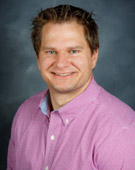 |
GERWIN SCHALK, PHD Gerwin Schalk, PhD Gerwin Schalk, PhD, Dr. Schalk obtained his M.S. in Electrical Engineering and Computer Science from Graz University of Technology in Austria, his M.S. in Information Technology from Rensselaer Polytechnic Institute (RPI) in Troy, New York, and his Ph.D. in Computer and Systems Engineering from RPI. He is interested in engineering, scientific, and translational aspects of devices that interface the brain with external devices for functional augmentation/restoration or for diagnosis. He authored or co-authored 86 peer-reviewed publications, one book and 8 book chapters, and has given more than 150 invited lectures world-wide. His work is currently funded by the NIH and the US Army and has been extensively featured by the media, including features on CNN, NBC, and CBS, articles in Discover Magazine, Technology Review, Wired, New Scientist, etc. He is also listed in Who's Who in the World and Who's Who in America, and received several awards for his work. |
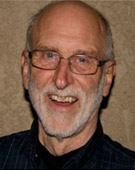 |
JAMES TURNER, PHD James Turner, PhD James Turner, PhD, received a BS in Engineering Science and a PhD in Biophysical Science from the State University of New York (SUNY) at Buffalo. He was a principle investigator at the Wadsworth Center, New York State's Department of Health and Prof. of Biomedical Sciences SUNY Albany, and Adjunct Professor of Biomedical Engineering Renessalear Polytechnic Institute. He was a founding member and Platform Leader of the National Science Foundation Science and Technology Center in NanoBioTechnology lead by Cornell University. He is presently a staff Research Scientist at Binghamton University's New York State Center of Excellence in Small Scale Systems Integration & Packaging. He is responsible for developing research programs to develop flexible substrate electronic devices for applications in the biomedical and biological sciences. He has 130 full-length multidisciplinary publications applying the principles of engineering and physical sciences to biological and biomedical studies. |
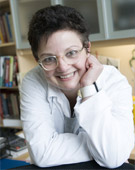 |
HELENE BENVENISTE, MD In the realm of translational research, Dr. Benveniste and her collaborators are currently investigating the application of combined PET-MRI to quantification of the glymphatic system. They are undertaking a pilot study to translate the preclinical studies into humans and to define PET-MRI imaging parameters for the evaluation of glymphatic function. The ultimate goal is the development of a clinical test will enable early identification of patients at risk for developing neurodegenerative diseases, particularly prion-like and protein disorders such as Alzheimer's, Parkinson's, Lewy Body disease and the frontotemporal dementias, as well as multisystem atrophy. |
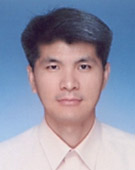 |
C. JUSTIN LEE, PHD C. Justin Lee, PhD C. Justin Lee, PhD, Principal Investigator & Principal Research Scientist, Director of Center for Neural Science, KIST, Deputy Director of Center for Functional Connectomics, KIST. Prof., Dept Neuroscience, The Univ of Science & Tech & Prof., Dept of Bio-Med, KU-KIST . Graduated from Columbis University with a PhD of Physiology and Cellulat Biophysics in May, 2001 and completed his post Doctoral Fellowship in 2004. Recently he recieved The University of Science & Technology, Best Mentor Award. |
